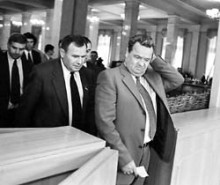The turnout for Verkhovna Rada’s eighth session was virtually 100%. Moreover, Prime Minister Anatoly Kinakh, de jure still a deputy, brought along his complete cabinet team. Although the president’s chair was empty, one could distinctly feel his presence in the hall.
Citing Speaker Ivan Pliushch, President Kuchma defined the immediate priorities in his address during the celebrations marking Ukraine’s ten years of independence. The speaker said he hoped the priorities set will be reflected in the government’s action plan, which he expects to receive in the immediate future. Simultaneously, he admitted that much in the implementation of these priorities depends on parliament. He also proposed lawmakers support putting the government’s progress report on budget implementation on the September 11 agenda. The present legislative session has justifiably been called the budget one. However, lawmakers should not ignore other priorities, he stressed.
According to Mr. Pliushch, parliamentary committees are expected to submit 450 bills for approval. Of these, 44 have been set aside by President Kuchma as first priority ones, and 100 bills have been rated by the government as second priority. Pliushch believes that, in doing so, the cabinet is demonstrating “serious intentions to consolidate positive changes” in the socioeconomic sphere. Speaking of the priority tasks facing Ukrainian lawmakers, the speaker stressed the need to consider the new tax code and enact the law on the judicial system. He also emphasized the importance of improving election laws.
Apart from this, the current Verkhovna Rada is supposed to approve laws on the State Property Fund, administrative and territorial divisions, central executive bodies, the cabinet, the president, and a number of other vital legislative documents.
From corridor talk it was clear that lawmakers are eager to hurry with the election law and concentrate on the budget process. The idea of a shorter period of election campaigning seems to sit well with all deputies, with the majority of political leaders declaring their readiness to plunge into the election battles. “The SDPU(o) has 265,000 members and 15,000 grass-roots organizations,” one of the party’s leaders, Leonid Kravchuk, told The Day. “We are a completely different team than the one that ran in the 1998 elections,” he added. He believes the election law will be enacted in September, with the party convention approving SDPU(o) nearly ready election rosters in October- November. There is nothing bad in a shorter campaign, he says, as in Europe “a mere forty days is often enough.”
Curtailed campaigning has also been welcomed by the Yabluko leader Mykhailo Brodsky, who believes that “in the three assigned months so much mud will be slung that Ukrainians will sure be in a shock for the next two months.”
“The Ukrainian People’s Movement does not see itself outside the Nasha Ukrayina (Our Ukraine) bloc,” UPM leader Yury Kostenko assured The Day. He also thinks the shorter campaign period is fine, while Communist Heorhy Kriuchkov is confident the campaign issue is far-fetched since it has already got under way. In his opinion, all political forces are ready for pre-election battles and the crucial issue is how well they will do in the elections.
The Verkhovna Rada Committee on State-Building and Local Government decided at its September 5 session that it intends to recommend lawmakers pass a new version of the election law, agreeing with some of President Kuchma’s proposals, Interfax-Ukraine reports. Still, the committee members disagreed over the shares of proportional representation and majority systems, with the committee proposing two alternatives for voting, a 50%-50% one and a 75%- 25% one.
“Due to the time factor, the elections will be held under the 50-50 system as most of the Ukrainian political parties are banking on campaigning over television and they look more appealing from television screens than in everyday life. While a deputy elected under the majority system walks his constituency and helps to buy ambulances, build roads, etc., the parties cannot do this,” political scientist Heorhy Pocheptsov believes.
Committee members also decided to recommend lawmakers to support 170-day campaign, thus cutting it by only ten days. “Many political forces will not be ready to start their campaigning in a month. Thus, the chance that the period will be made shorter by the lawmakers is quite great. However, some parties have been ready for campaigning since long ago, I mean the Communists and the SDPU(o), and there consequently may arise some disagreement over the campaign terms, political scientist Mykola Pohrebynsky maintains. But neither the Communists, nor the SDPU(o) has declared any wish for an early start. Moreover, Leonid Kravchuk told The Day that a shorter race would be quite welcome. Apart from these proposals, the committee members will recommend that legislators approve a procedure whereby voters stamp their favorites’ names on election ballots rather than make marks on them as before.
The committee urged the leaders of parliamentary caucuses and groups to pass a political resolution prior to voting the new version of the election law and calling to support it. According to the Verkhovna Rada agenda, hearings on the election law will be held on September 13.
The Cabinet of Ministers conformed the 2002 draft budget, setting expenditures at UAH 57.1 billion, UNIAN reports, with the budget deficit at 1.7% or UAH 4.2 billion which, according to Finance Minister Ihor Mitiukov, was due to not including the receipts from privatization under budget revenues. 52% of the expenditure will be earmarked for social programs. The 2002 budget surplus was set at 1%, which, he says, will make it possible to service and repay Ukraine’s foreign debt 2002 installment thereby reducing Ukraine’s total foreign debt by $400 million and its size will not exceed 35% of GDP.
One draft budget priority is the development of the regions, with the relationship between the central and local budgets clearly delineated. According to the finance minister, the share of the local budgets will rise to 39.5%, which is as close as possible to the target set by the president in his address to Verkhovna Rada.







